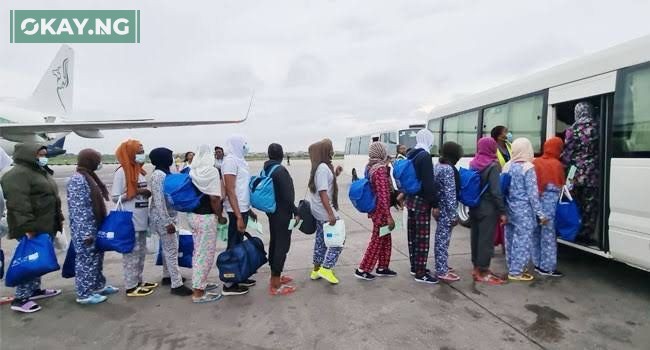For thousands of Nigerians, the dream of a better life abroad has turned into a nightmare of suffering, exploitation, and heartbreak. Now, more than 20,197 of them have made the painful journey back home, assisted by the International Organisation for Migration (IOM) and the Nigerian government.
Women and young girls make up a staggering 88% of these returnees—many of whom were victims of human trafficking, forced labor, or sexual exploitation. Most were lured by false promises of jobs and opportunities, only to find themselves trapped in desperate conditions.
According to the IOM, the majority of these migrants attempted to reach Europe through the deadly Mediterranean route, with Libya, Mali, and Italy being their main destinations. But instead of the bright future they envisioned, many ended up in detention centers, forced labor camps, or caught in the grip of traffickers who saw them as nothing more than commodities.
Between April 2017 and May 2018 alone, over 7,000 Nigerians were repatriated from Libya, where they had been detained under horrific conditions. Another 750 were returned from countries like Niger and Mali. By early 2022, nearly 19,500 Nigerians had been assisted back home—but the flow of desperate migrants hasn’t stopped.
In the first quarter of 2024, IOM facilitated the return of 167 victims—81% of whom were female. The main reason? Economic hardship. A staggering 94% of returnees admitted they left in search of better opportunities, hoping to escape unemployment, poverty, and difficult family situations.
But the reality they encountered was far worse than anything they had imagined. Libya remains the most dangerous hotspot for Nigerian migrants, with 53% of returnees reporting severe abuse there, followed by Mali, where 29% faced exploitation. Since the fall of Muammar Gaddafi in 2011, Libya has become a lawless zone where traffickers operate freely, and reports of modern-day slavery and extortion have surged.
Victims who returned from Libya revealed they were subjected to forced labor, with many women suffering sexual exploitation. In Mali, trafficking rings forced young girls into prostitution, with 98% of victims being female. Many were betrayed by people they trusted—friends or acquaintances who convinced them to leave, only to sell them into slavery.
Even after making it back to Nigeria, the struggle continues. Reintegration remains a major challenge, with many returnees feeling lost, stigmatized, and unsure of their future. While the IOM, Nigerian government, and NGOs have provided support—including medical care, vocational training, and economic empowerment programs—many still feel trapped in a cycle of poverty.
Zakaria Dauda, a former spokesperson for the National Agency for the Prohibition of Trafficking in Persons (NAPTIP), warned that despite their painful experiences, some returnees are already looking for ways to leave again. “Many believe the grass is greener on the other side, but the reality is harsh. There’s no free lunch anywhere,” he said.
Imaobong Ladipo-Sanusi, Executive Director of the Women Trafficking and Child Labour Eradication Foundation, stressed the need for greater awareness. “We cannot stop people from migrating, but we can make sure they are properly informed. The more they understand the risks, the better decisions they will make,” she said.
As thousands of Nigerians return home with shattered dreams and scars—both seen and unseen—the urgent question remains: How can Nigeria create opportunities that will keep its citizens from risking their lives for a future that too often ends in tragedy?













